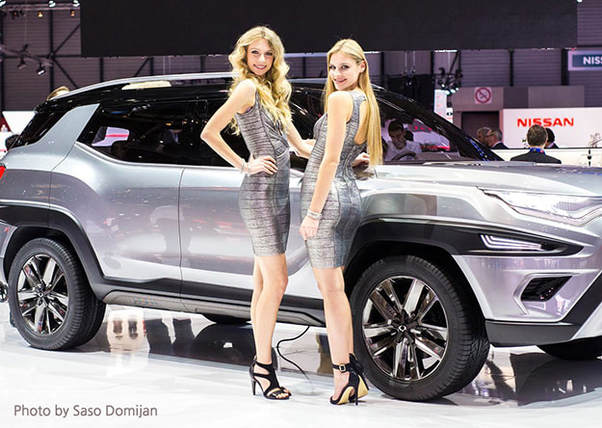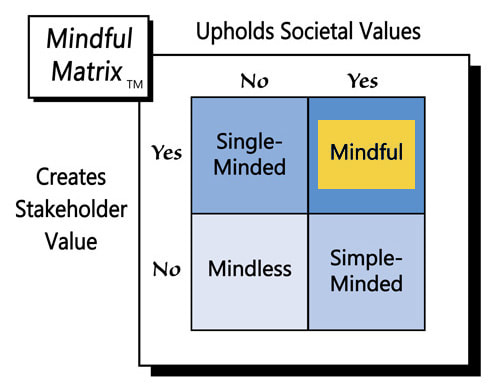A variety of media, from calendars to TV commercials, couple women wearing suggestive attire with cars. The rationale for these pairings is that sex sells; i.e., certain companies believe that they can gain interest in their autos’ bodies by leveraging the natural allure of the human body.
Over the years, auto shows have been notorious for their use of highly-sexualized female models: Poised next to a manufacturer’s hot new car are one or more attractive young women, often sporting stilettos and wearing tight-fitting dresses with low necklines and high hemlines.
However, use of women as commercial eye-candy isn’t unique to automobiles. A variety of other industries like video gaming and consumer electronics employ ladies at tradeshows in the same sultry capacity. In fact, there’s even a belittling name for the women: “booth babes.” TMS Agency, a modeling firm with locations in virtually every state, specializes in such talent, describing the women’s function as follows:
“A booth babe is a female model hired to staff a booth at a trade show. The term implies a girl who is focusing more on her physical attributes to entice customers rather than her intellect to represent a company. Booth babe is also slang for a booth girl. Booth babes serve two purposes: 1. Attract attention to your exhibit due to their looks; 2. Assist with activities and demonstrate products”
It’s not hard to find women serving this primeval purpose at some of the world’s largest and most renown auto exhibitions like the Paris Motor Show and the North American International Auto Show. However, visitors to another major auto exhibition will no longer be exposed to the practice.
In its 88th year, the Geneva International Motor Show has hosted more than its fair share of booth babes. Just last year, for instance, Lexus, Fiat, and Alfa Romeo used attractive young women, outfitted in evocative attire, to help draw attention to their respective automotive entries. It appears, however, that this March in Geneva will be different.
Fortune reports that many of the exhibitors at this year’s show will not be bringing both babes. Some companies, like Lexus, won’t have any people accompany their cars. Other manufacturers, such as Fiat Chrysler, will use both men and women, outfitted in more conservative attire.
What’s caused the sudden change of heart for so many automobile manufacturers? Some cite the recent rise in cases of sexual harassment and a desire not to get caught on the wrong side of the #MeToo movement. Switzerland-based Nissan spokeswoman Sara Jenkins frames her firm’s decision in a straightforward, positive light: “It makes more sense to use product specialists because we’re selling cars.”
Anyone in marketing should appreciate Jenkins’ rationale—If your company is selling a product, particularly a complex and expensive one like a car, you want people who can talk intelligently about the vehicle’s features and benefits. That’s one of the top requirements for effective personal selling.
But, why not have both? Certainly, there are individuals who are very attractive and very smart. Why don’t automobile manufacturers hire them to wear skimpy clothes and work their tradeshows? One reason is that smart, hard-working people aren’t as easily enticed, and they know they have options other than putting their bodies on display.
Hopefully these car companies also realize what they’ve been doing to the women they’ve had on exhibit for so many years. The manufacturers have relegated these young women to human hood ornaments—items to ogle and awe at, like the masses of metal they’re posed to adorn. Just as the car companies have minimized the models’ attire, they’ve stripped away each woman’s personhood.
Unfortunately, that sexual objectification doesn’t only impact the models who participate in the tradeshows. It affects all people indirectly. The more we see women, or men, treated as objects, the more likely we are to think that such representations are normative, i.e., to believe that they’re okay.
Ironically, while reading the aforementioned Fortune article, an ad appeared on the side of my screen titled “Dream Big, Princess.” The link connects to Disney’s website where a 90- second video highlights many of the company’s animated heroines, interspersed with clips of young women today engaged in adventurous activities. The promotional piece encourages girls to become things like teachers, politicians, preachers, astronauts, and leaders. Of course, there’s no charge to grow up to be a booth babe.
Automobile manufacturers might not be banishing booth babes because of social conscience, but at least they're banishing them. Our world’s women and men will be better off as a result. The car companies also should be more successful in the long run, especially when targeting market segments that are increasingly and rightly appalled by the primitive practice. Showing people genuine respect will always be a foundation for “Mindful Marketing.”
Learn more about the Mindful Matrix and Mindful Meter.
Check out Mindful Marketing Ads and Vote your Mind!




 RSS Feed
RSS Feed